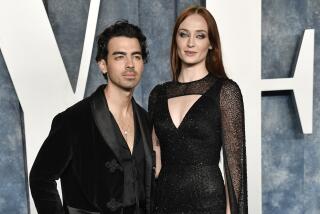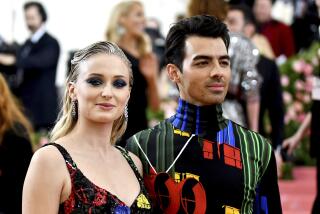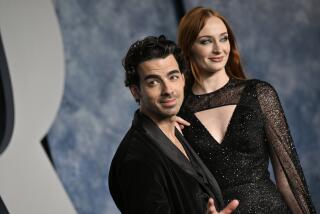Sophie Turner sees âGame of Thronesâ heroine Sansa Starkâs future and itâs looking bright
Sansa Stark went through one of the more remarkable transformations on âGame of Thrones,â and actress Sophie Turner changed along with her.
âI started when I was 13 and Sansa was 11, I think. Sheâs been my whole life,â said the 23-year-old Turner.
The actressâ profile rose with the showâs â she shared six SAG nominations with the cast, had six movies released during the âGamesâ run (including joining the âX-Menâ movie franchise), gained millions of social media followers, and even married a Jonas Brother (Joe) in a surprise wedding this May. The first-time Emmy nominee chatted with The Envelope about growing up in the spotlight and growing into the role of future queen.
I have to admit I found Sansa one of the more objectionable characters at first â her tween petulance and selfishness. But she was a very young girl entering into a momentous relationship (an arranged marriage into a poisonous family).
Honestly, I was going through the same thing, but that âmomentous relationshipâ was between myself and the television and film industry. Sansaâs being thrown in the deep end in this world she doesnât understand. She doesnât have any perspective other than a [kid] looking through rose-tinted glasses. That was kind of me.
Then, being around Peter Dinklage and Lena Headey and all these incredible actors â Charles Dance â I started to find my footing. Sansa did the same thing, learning these politics and how to fit in, absorbing all this information from all these great manipulators. Sansa learns to hide her feelings, to absorb all this information from them but keep it hidden while they still think sheâs innocent.
Then she goes into such a traumatic period [with Ramsay]; that changes her. You, Sophie, had done a lot of living, experiencing how big âGame of Thronesâ could be, experiencing stardom for several years. Were there times you could feel your own growing worldliness feed the colors you could show as Sansa?
As a person, you become more closed off [due to fame]. It fed into Sansa, for sure. Coming in at age 13, I couldnât have played Sansa at 17. I wouldnât have lived enough life.
When she was first captured by Ramsay, there was that awful loneliness and desperation. I was going through a period where I was really struggling to find an identity. My friends were at university, and I never got to see them. I was desperate for human interaction outside of work. For the first time in my life, I felt unhappy.
The nightmare she endures at the hands of Ramsay, I think, is a tipping point for her. That would break a lot of people. Not Sansa. Would you agree her survival launched her into becoming the truly strong woman she is at the end of the series?
Absolutely. I think she always had that strength, always, but [thatâs] where she either decides to give up or get away. The moment she does that, the resilience that has always been in her is kind of ignited again. Itâs the first time the audience can really taste that. I donât think she can hide it at this point.
By the end, Sansa is one of the smartest characters on the show. She allows schemers to think theyâre manipulating her before crushing them, and she recognizes people, including the seemingly beneficent Daenerys Targaryen, for what they truly are.
[Showrunners David Benioff and Dan Weiss] and I spoke about it a lot ... the ways people are blinded by power. She can spy that in anyone. Sheâs seen too much; she canât be [too] vigilant. We always thought she had her head screwed on maybe the best of all the characters.
She finishes as Queen in the North. How do you know sheâs the right person for that role?
The fact that she doesnât want power is also something to be said for her. She only cares about the North.
Thatâs a fair answer to the many fans who wanted Sansa to take the Iron Throne. But what you just said makes sense: Sheâs happier in the North. What do you see in her future?
No wars, no battles. I see her leading until sheâs very old. I donât see her getting married or having children. I think it would be a democratic kind of kingdom. Sheâd die of old age, very happy.
More to Read
From the Oscars to the Emmys.
Get the Envelope newsletter for exclusive awards season coverage, behind-the-scenes stories from the Envelope podcast and columnist Glenn Whippâs must-read analysis.
You may occasionally receive promotional content from the Los Angeles Times.











